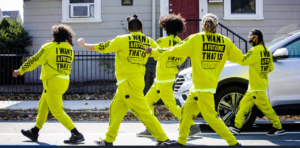 The despairing news from COP27 leaders followed by the delight of the Black Fern’s win in the same week had me thinking about how we balance these dichotomies without getting distracted from the task at hand.
The despairing news from COP27 leaders followed by the delight of the Black Fern’s win in the same week had me thinking about how we balance these dichotomies without getting distracted from the task at hand.
When researching material for a CATE (Careers and Transition in Education) conference presentation later this month, I came upon this statement from an 18-year-old student; “The ice caps are melting and my hypothetical children won’t get to see them, but also I have a calculus test tomorrow” quoted in a 2020 Washington Post article. This sentiment seems to reflect a similar feeling, that we know what is happening and that we need to pay attention to it – but life goes on!
How do we take action to halt the speed of climate change when most of us are trapped in the structures and commitments of life and work?
The impact of impending climate chaos on careers and mental health is creating growing anxiety, especially in our youth and younger generations. In the Deloitte survey – Striving for Balance, Advocating for Change 2022, it was reported that 73% of Millennials and 75% of Gen Zs view the world at a tipping point and the future could go either way.
Al Gore said in his address to Cop27, “We have a credibility problem” – saying that there is no time for ‘moral cowardice’ and ‘reckless indifference’ towards humanity. It seems that younger people are more aware of the need for change than most of us bounded by social structures, lifestyle habits, and a dependence on income to pay the bills. However, there are some great things happening, particularly in education to encourage global responsibility and agency.
According to a recent survey, 42% of students say they want to work in areas that positively affect climate change. The 80,000 hours.org website has many wonderful articles about high-impact careers and in a quick search, I found over 100 job vacancies in Aotearoa directly related to climate change and the environment.
Dr Candy Ho, from Canada was inspired by the United Nations (UN) 2030 Agenda for Sustainable Development, introducing into a university career transition course the 17 UN Sustainable Development Goals (SDGs) in its curriculum. Students pondered three big questions:
- What is the world that I want to live in?
- What do I see are the global problems or opportunities that need our attention?
- What are my talents and experiences that may help address these problems and, in turn, improve the condition of our world?
If each of us was to answer these three questions and act on the reflection, we could all contribute to turning this impending catastrophe around. We don’t need to be loud about it, and quiet action and gentle influence is important. Putting our hand up for initiatives at our work, or outside of it, that reduce negative impacts on the climate; taking action – where we can. The tide is turning and we can impact change when there is collective will, hope and action.
If you have a dilemma of conscience or your values are in conflict with your work focus, a good career coach could help you review your career direction and the skills and experience that could be transferrable into work that is making a difference. Or get involved in sustainability projects at work.
The Black Ferns went into the final of the Rugby World Cup with hope, in spite of knowing of the battle they were about to face. They set an example of the collective will to win against the odds. While the excitement of our achievements fulfills many of our needs to feel good, we do need to face the reality. The seas we are journeying on will get rough and stormy and we are very likely to be swamped by the turbulence. So, we all need to pull together – to get through this.
He waka eka noa – we are all in this canoe together
Kaye Avery, FMCDANZ, HRNZ, CATE

Leave A Comment